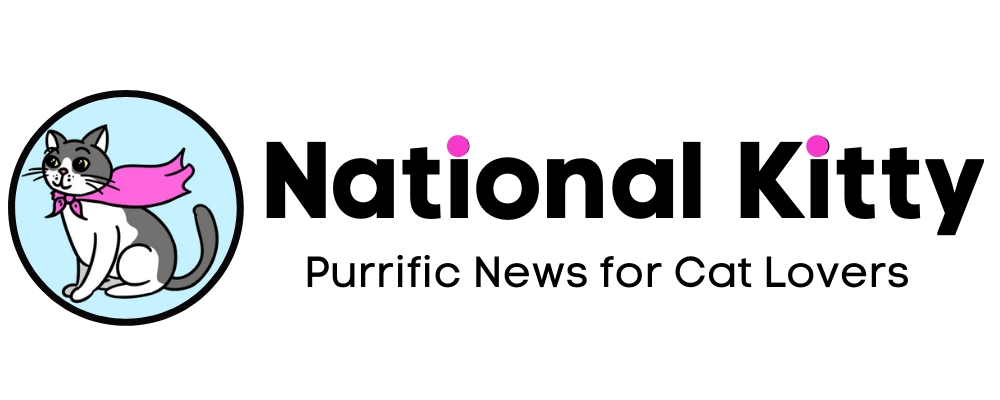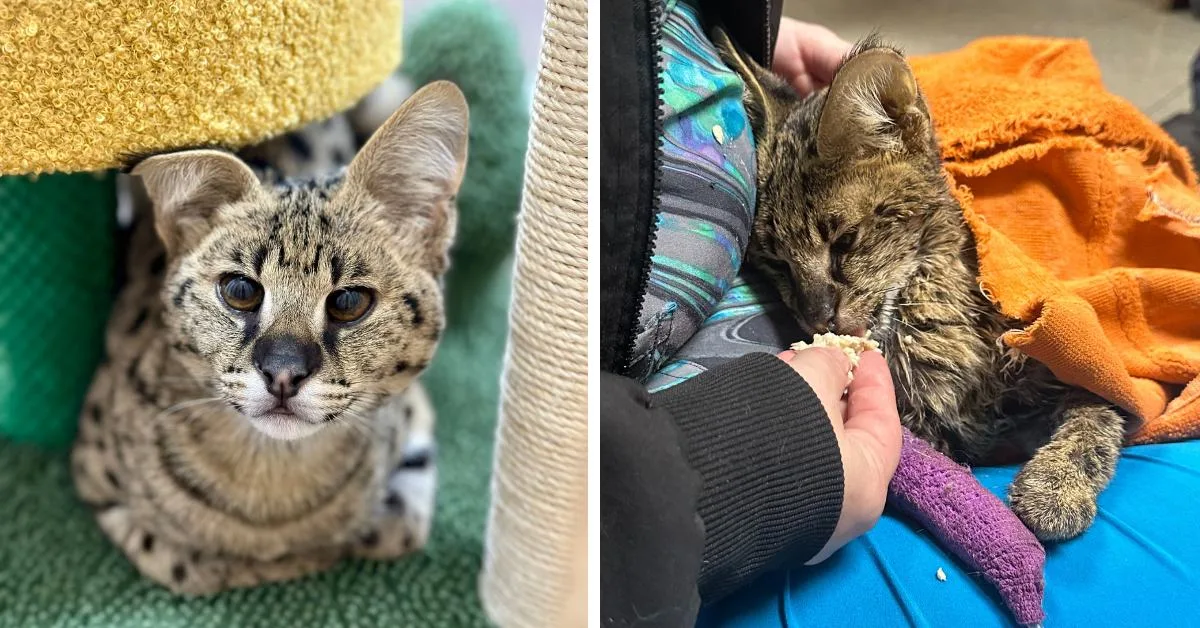Meet Zara, a beautiful F1 Savannah cat who was recently hospitalized due to a tragic series of events– a direct consequence of the increased demand for exotic cats and the greed of exploitative breeders.
Keep reading to discover how a coveted $20,000 cat from California found herself battling a tragic fate in a veterinary hospital in rural Arkansas.
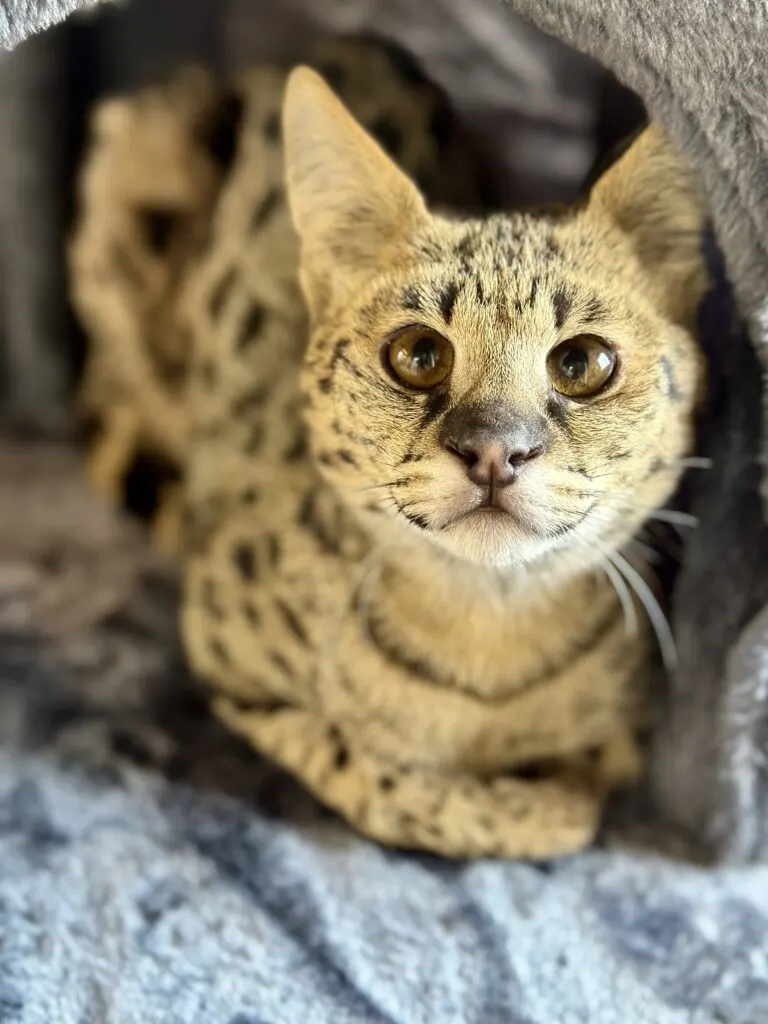
A Call for Help
Zara’s story began when, Sarah Richardson, rescue coordinator for Community Cats of Central Arkansas, received a call from a man wanting to surrender his F1 Savannah cat, Zara.
F1 Savannah cats are first-generation hybrids, born from the cross between a domestic cat and an African serval.
Despite spending $20,000 on Zara, the family found themselves in over their heads.
Zara’s life until that moment had been marked by confusion and neglect.
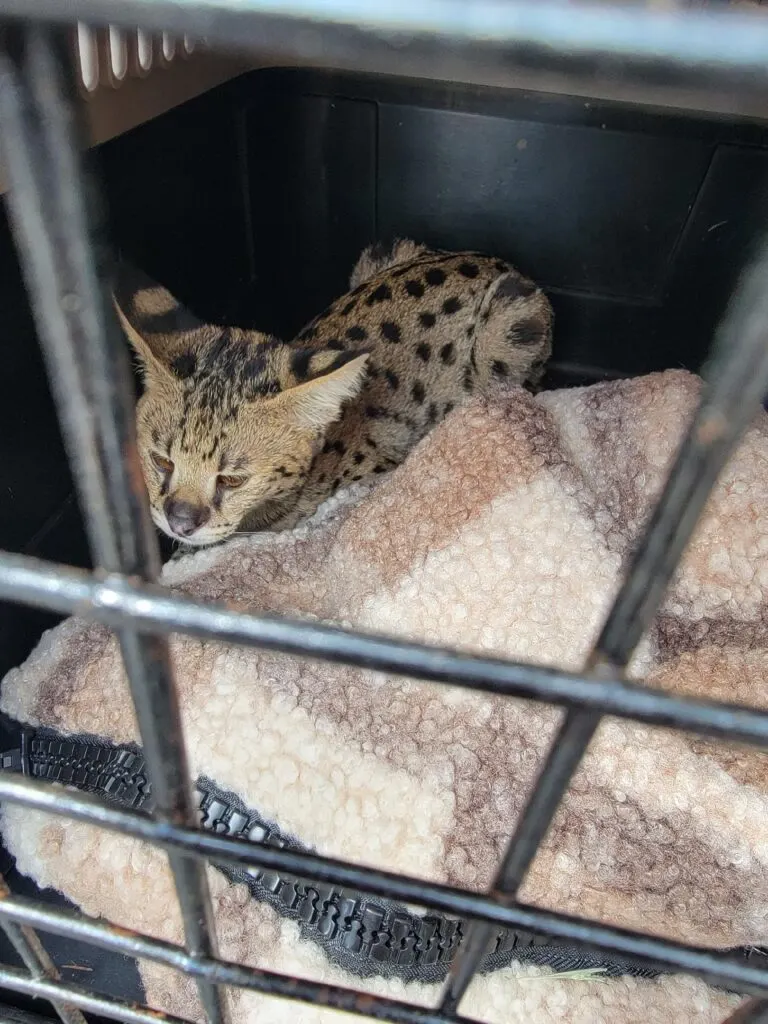
Purchased in California and brought to Arkansas, she was only five months old but had already endured trauma and hardship.
Her owner’s children were afraid of her, and the man admitted that Zara would growl and swipe at them.
The owner, who had no experience with Savannah cats, was not aware that this behavior was very standard for the breed.
For Savannah cats, growling can be a sign of excitement or enjoyment.
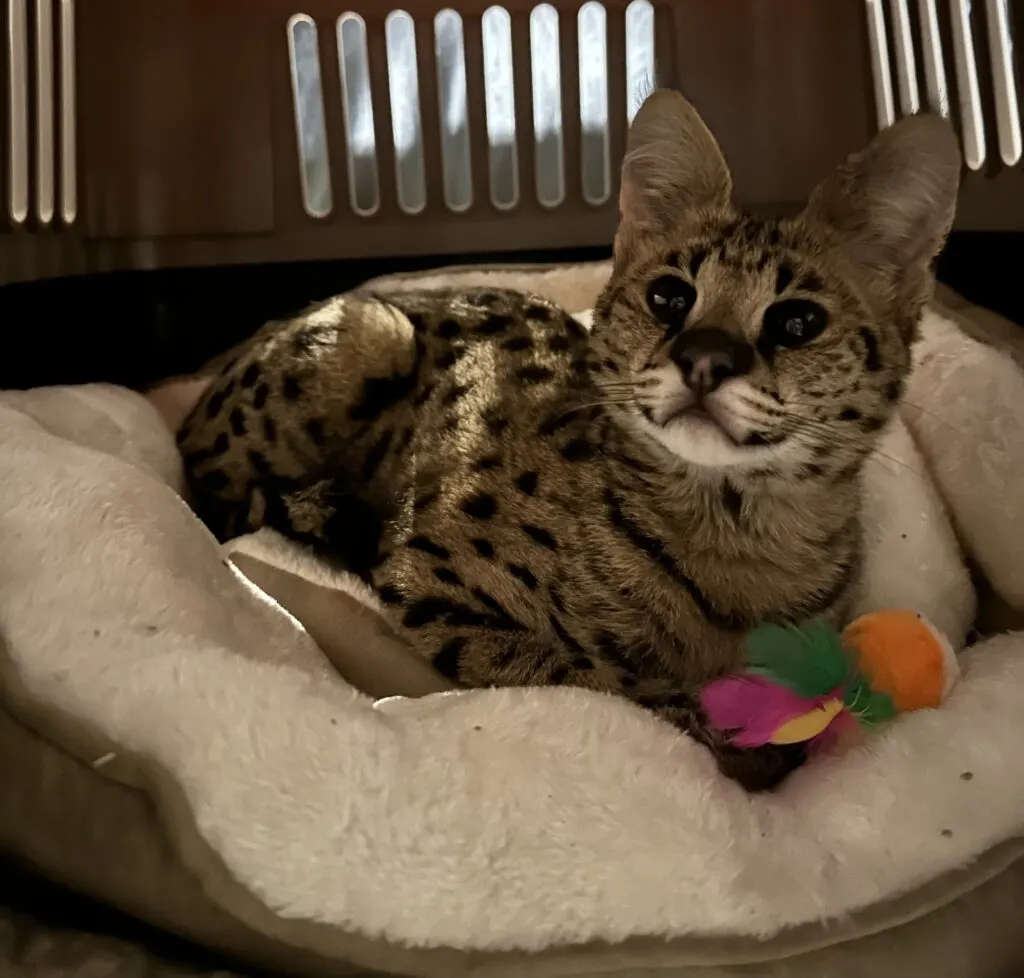
Their wild lineage makes them behave differently from domestic cats, which is often misunderstood by those unfamiliar with their needs.
“This is another classic case of someone spending an insane amount of money on a breed of cat they haven’t researched,” said Sarah.
Sarah agreed to take Zara and started the intake process by requesting veterinary records, leading her to discover something disturbing…
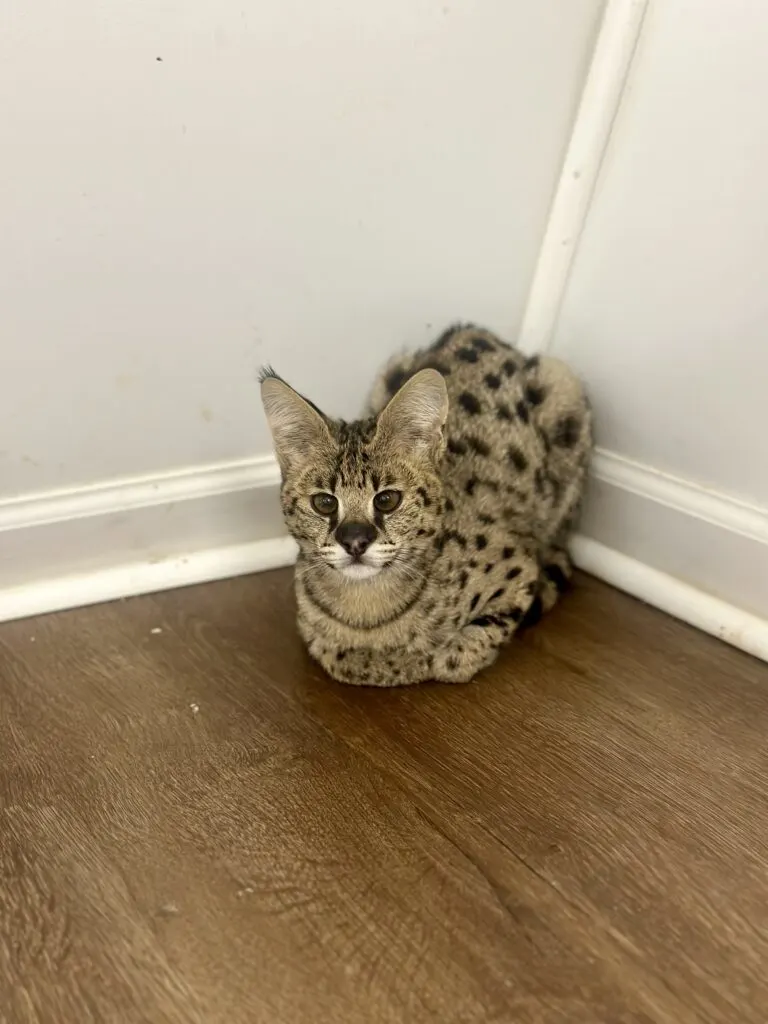
Zara’s Troubling Past
Sarah was both shocked and frustrated to find out that Zarah had been declawed a month prior.
“Declawing is detrimental to any cat, but for a Savannah cat, it’s devastating,” said Sarah. “Since they’re already under a lot of psychological stress from being a semi-wild cat in a household setting, they desperately need their claws to manage their stress and express natural behaviors,” she explained.
The good news was that Zara was already spayed, but the bad news was that she was in very poor health.
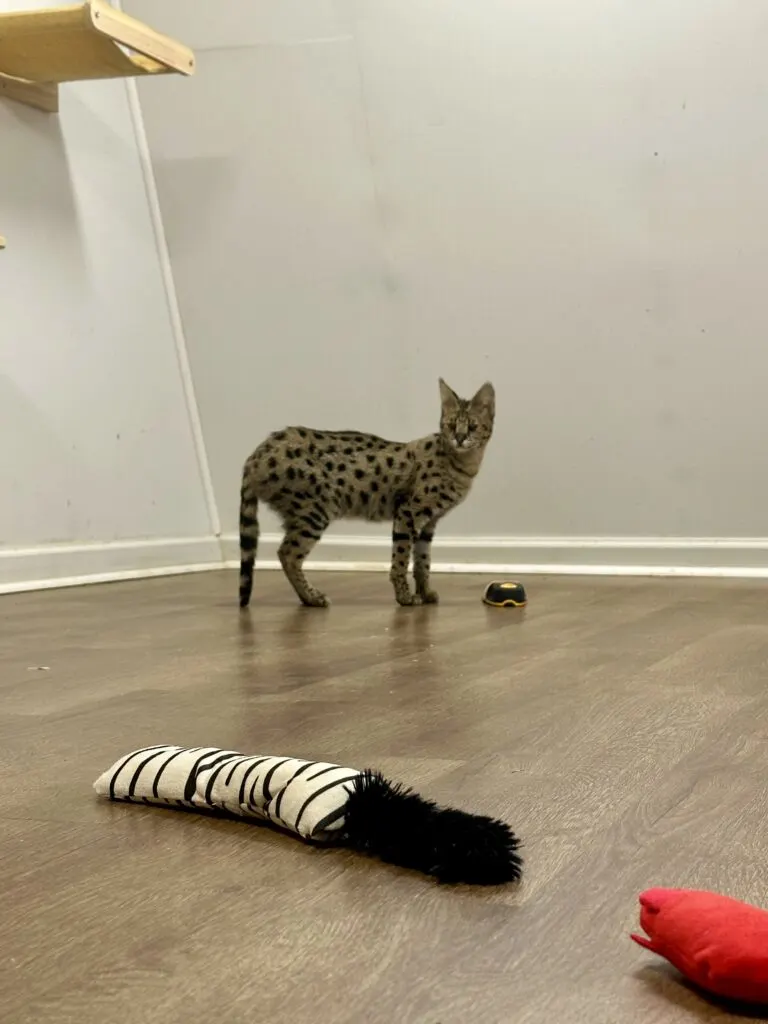
The first thing Sarah noticed about Zara was that she was underweight—just 5 pounds instead of the expected 10-15 pounds for her age.
“We immediately put her on a special diet to help with her nutritional deficit,” said Sarah. “She should be much larger than she is.”
Her fur was greasy and unkempt, and she was severely dehydrated.
Zara’s problems didn’t end there; she wasn’t litter box trained and suffered from severe diarrhea caused by parasites which she was promptly treated for.
“She wasn’t aggressive, but she was extremely fearful of people. She needed her own space to decompress and cope with all the sudden changes,” Sarah noted.
Luckily, Sarah had recently built a temperature-controlled barn on her property to provide adoptable cats with a comfortable space. Zara was the first to use it!
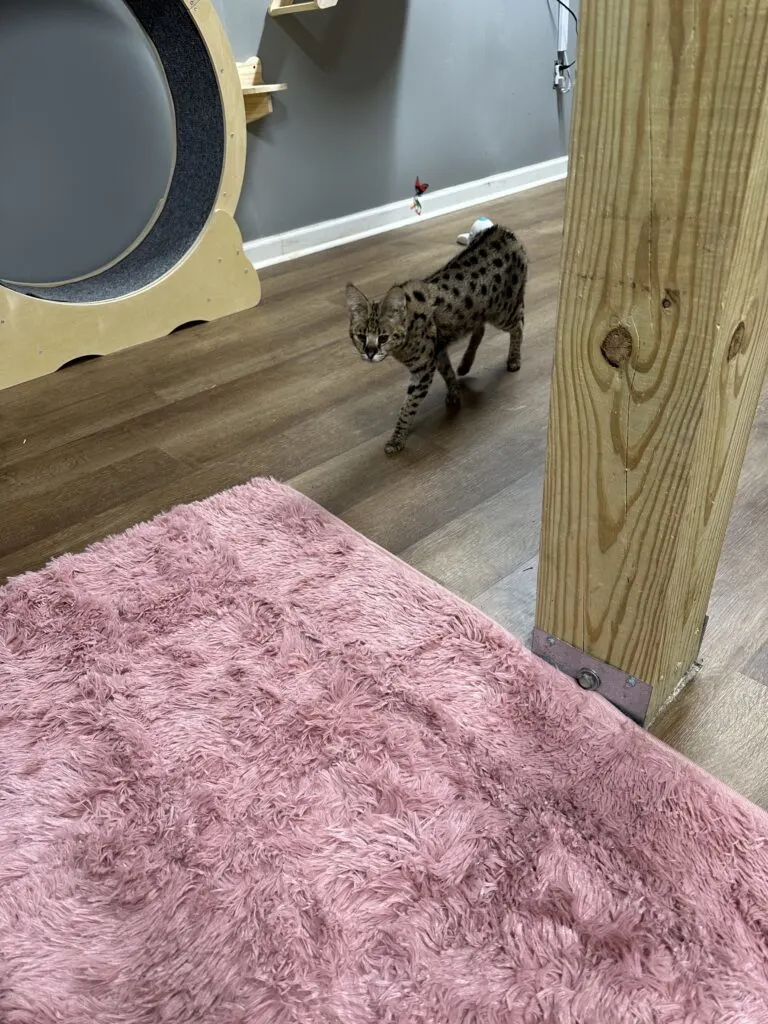
The Slow Path to Socialization
To help Zara adapt, Sarah employed a socialization strategy based on patience and observation.
“We don’t act scared of her. Cats react to our emotions, so when we’re calm, she’s calm,” said Sarah.
Consistency became the key to easing Zara’s fears. Sarah kept a predictable care routine and left cartoons playing throughout the day to expose Zara to human voices.
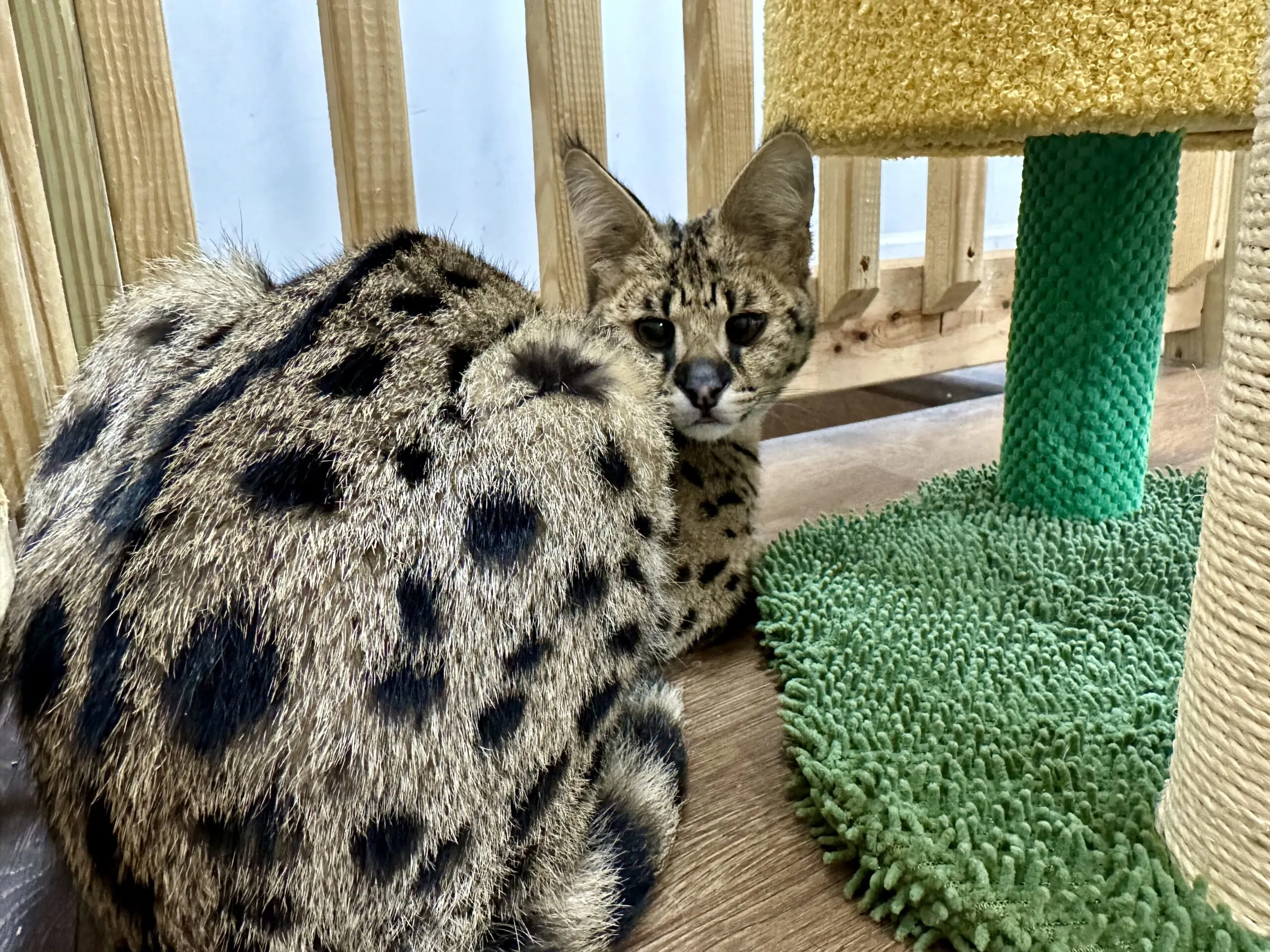
“I check on her through the cat camera when I’m not home, and it’s so funny to see her sitting on the couch watching TV,” said Sarah.
Zara’s introduction to toys revealed more signs of her neglected past.
“At first, she was terrified of them, which made me wonder if her previous owners ever provided toys at all,” Sarah recalled.
But once she realized her toys wouldn’t hurt her, Zara started to play and become more physically active.
Despite the improvements, Zara’s battle was far from over.
Just as she began to show signs of trust and better health, tragedy struck.
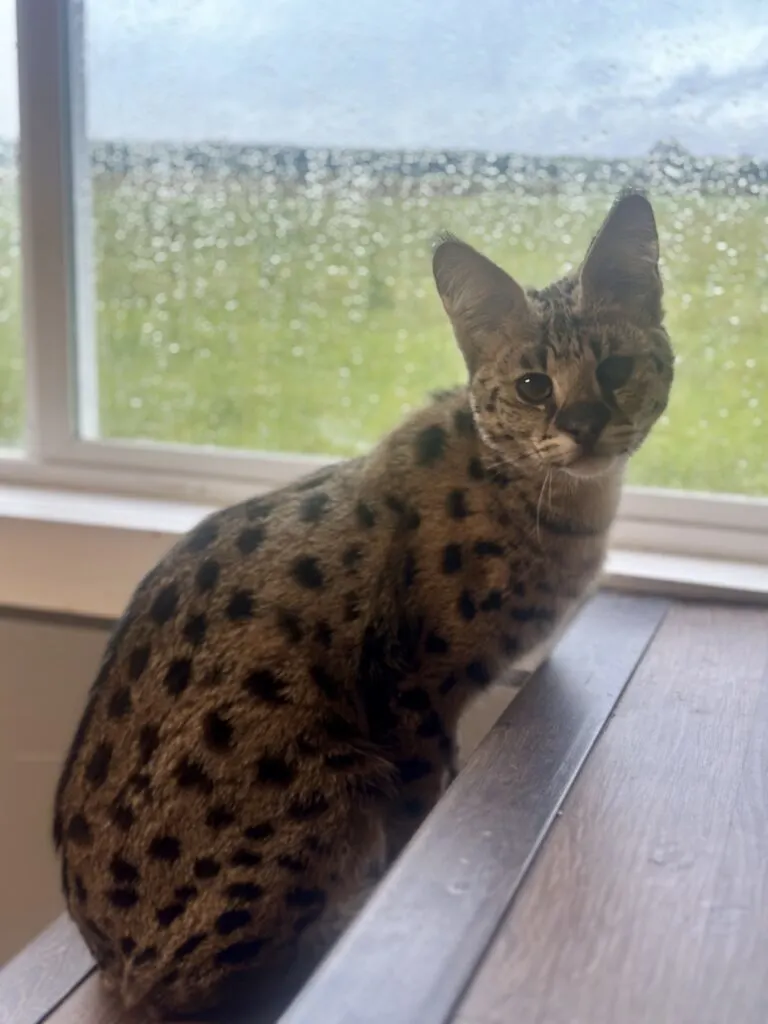
An Unforeseen Crisis
“We found out she has a genetic condition that led to severe avascular necrosis, liver disease, and non-regenerative anemia,” Sarah shared somberly.
She was also diagnosed with toxoplasmosis, which her vets speculated was transmitted due to poor breeding conditions.
Zara was rushed to the veterinary hospital where she underwent a blood transfusion with blood donated by one of Sarah’s foster cats with a matching blood type.
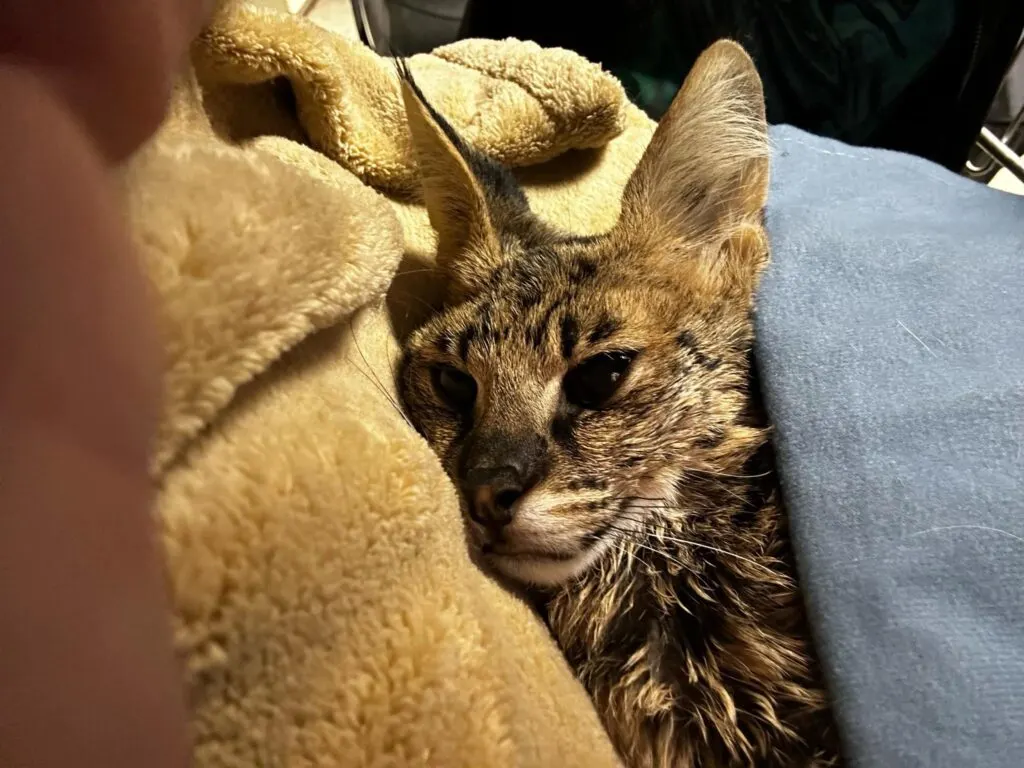
Sarah was utterly heartbroken, spending any moment she could spare at the animal hospital so Zara could be comforted by her presence.
“I don’t want her to endure any more stress than she already has,” said Sarah. “She finally trusts me, so I don’t want her to feel even more stressed by all the unfamiliarity.”
The fight for Zara’s life continues, with Sarah and the veterinary team providing round-the-clock care to save her life.
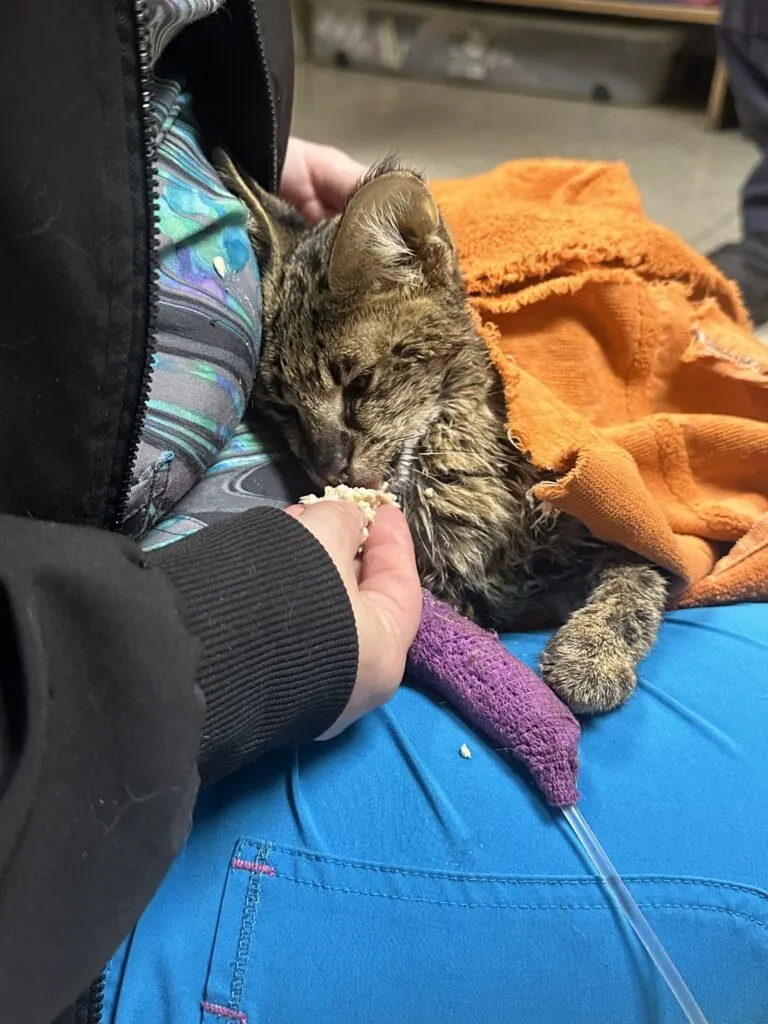
“She’s starting to eat small amounts of wet food, which is a good sign, but she’s still in critical condition,” Sarah said.
Sarah has the same policy for all the cats that enter the rescue: she will not consider euthanasia until she has exhausted all options.
However, doing what’s right for the cats comes at a large cost.
“Our rescue relies on donations to help these cats,” said Sarah. “We’re always trying to scrape together enough money to pay for veterinary bills.”
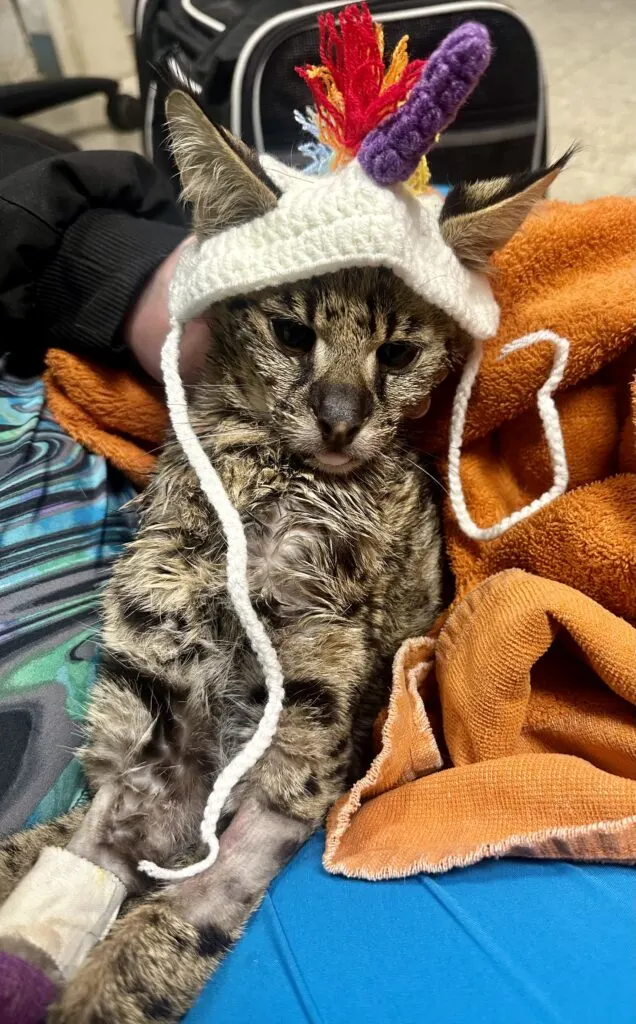
Help Save Zara!
Zara is facing an uphill battle, but she has a strong will to live.
If you’d like to contribute towards Zara’s hospitalization, rehabilitation, and life saving treatment, please consider directly donating to Community Cats of Central Arkansas or donating through the Meow Mail Program.
If you choose to donate through the Meow Mail Program, you’ll be sent an update on how your donation helped Zara.
“We want this sweet girl to have a bright future with a loving family,” said Sarah. “She’s come too far for it to end here.”
She deserves a future with a forever family who can offer her the patience, love, and care she needs to thrive.
She has endured enough neglect and hardship– it’s time for her to experience the safety, love, and stability every cat deserves.
Your support can make all the difference in her recovery and ensure she finds a home where she is cherished. If you’re unable to donate, please share in hopes that Zara can live happily ever after.
Together, we can give Zara the hope and happiness she’s been waiting for.
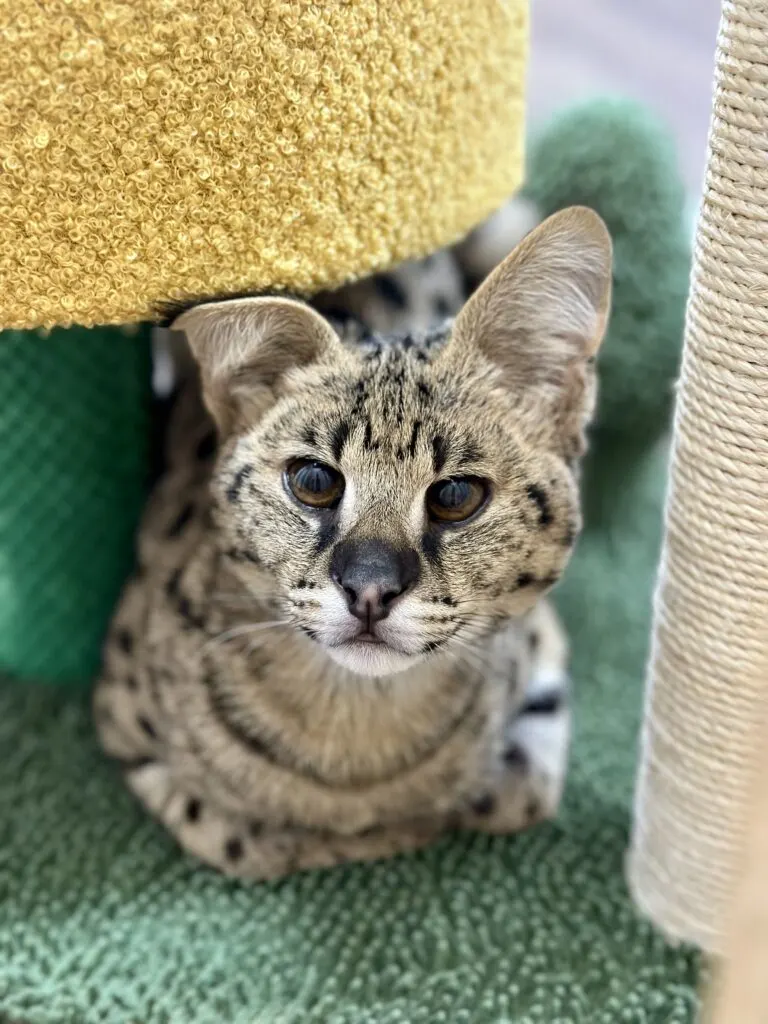
About Our Heroes
Donations benefit Community Cats of Central Arkansas, a small, foster-based 501(c)3 non-profit that rescues and rehabilitates cats that are victims of cruelty, neglect, and abandonment in a rural community with high animal cruelty rates and limited resources.
Most high-profile, well-known rescues receive millions of dollars in donations, but pay their CEOs six- or even 7-figure salaries.
In contrast, CCCA is run by two dedicated women who do NOT take salaries and have significantly higher intake rates by comparison.
They rely entirely on donations from kind-hearted individuals to continue saving cats & kittens that would otherwise suffer a tragic fate.
In addition to their direct intake, they pull special needs cats, senior cats, and cats in critical condition from the top kill shelters in the state to prevent unnecessary euthanasia.
CCCA’s integrity and commitment to animal welfare is the reason why National Kitty proudly supports and advocates for them by using our media presence to draw awareness to their rescue efforts.
Please follow Sarah Richardson on Instagram and Community Cats of Central Arkansas on Facebook to witness more of their heartwarming rescue missions.
Adopting Zara
Zara won’t be available for adoption until she has fully recovered and been properly socialized, however, finding a suitable home for her will be challenging.
Community Cats of Central Arkansas is already very selective about adopters, but in Zara’s case, the criteria for an adopter is even stricter.
“We thoroughly vet all adoption applications to make sure all of our cats are adopted by loving, responsible families,” said Sarah. “But Zara is going to need much more than that.”
There are 3 important qualities Sarah is looking for in Zara’s future adopter.
- 1. A tremendous amount patience
- 2. Experience with Savannah cats
- 3. The ability to financially support a Savannah cat
“It’s really important that her future adopter has experience with Savannah cats,” said Sarah. “Taking care of these cats is much more labor-intensive than domestic cats.”
For now, Zara will continue to be fostered by Sarah until she’s physically stable and socialized.
However, Sarah is open to putting qualified applicants on a waiting list for future consideration.
If you’d like to get in touch with Sarah about adopting Zara in the future, please send her a message through the Community Cats of Central Arkansas Facebook page.
Want A Savannah Cat? Think Again.
Zara’s case highlights the harsh reality of owning exotic pets and why the breeding industry is both corrupt and cruel.
The initial price, often between $10,000 and $25,000 for an F1 Savannah cat, is nothing compared to the ongoing costs of specialized care, veterinary bills, and home modifications needed to accommodate their wild instincts.
Potential owners often overlook these significant needs, fueling an industry that profits from ignorance.
“The real expense comes in taking care of them over a lifetime,” said Sarah. “They cost a lot of time and money”
In the words of Jay Z, “If you can’t buy it twice, you can’t afford it.”
If you’re “saving up” for an exotic cat, that’s already a good sign that you’re not qualified to have one.
In Sarah’s opinion, F1 Savannah cats should have never been considered pets in the first place.
“They may be considered ‘domestic’ by a breeder’s standards, but I don’t agree with that at all,” Sarah stated. “It’s very misleading to call them domestic.”
Can they cohabitate with humans like a standard domestic cat? Under the right conditions, yes. But should they? No.
The truth is, most exotic cats are bred under unethical conditions, contributing to an abusive cycle while countless cats sit in shelters waiting for homes.
Meanwhile, there are millions of cats in shelters that face euthanasia every year due to overpopulation.
The solution lies in responsible pet ownership and supporting rescues, not breeders
If you’re interested in purchasing a Savannah cat, ask yourself why.
If you are in the very small percentage of people that meet the criteria of someone who can care for a Savannah cat, then there’s no reason to purchase from a breeder and increase the demand.
“If you want a Savannah cat, the first step is doing A LOT of research to make sure that you’re able to care for one,” said Sarah. “Then I would strongly suggest adopting from a breed-specific rescue or regular rescue.”
There are thousands of breed-specific and standard rescues that give surrendered and rescued Savannah cats a second chance at life.
Even if there’s a waiting list, it’s well worth the wait to adopt these cats in an ethical and compassionate way. For those who wish to support Sarah’s ongoing efforts to rescue and rehabilitate cats like Zara, consider donating to the Meow Mail Program.
